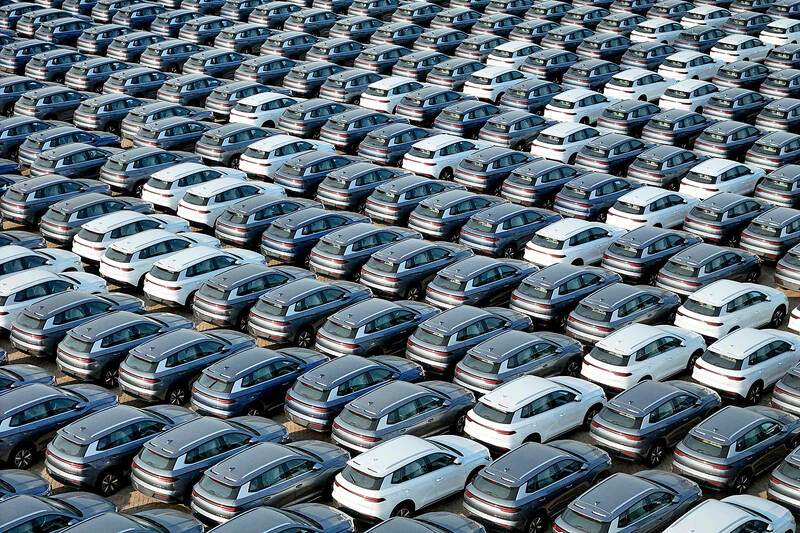China on Thursday said that an investigation had found the EU imposed unfair “trade and investment barriers” on Beijing, marking the latest salvo in long-running commercial tensions between the two economic powers.
Officials announced the probe in July last year after Brussels began looking into whether Chinese government subsidies were undermining European competition.
Beijing has consistently denied its industrial policies are unfair and has threatened to take action against the EU to protect Chinese companies’ legal rights and interests.

Photo: AFP
The Chinese Ministry of Commerce said the implementation of the EU’s Foreign Subsidies Regulation (FSR) discriminated against Chinese firms and “constitutes trade and investment barriers.”
It did not mention whether Beijing planned to take action in response.
The two are major trade partners, but are locked in a wide-ranging standoff, notably over Beijing’s support for its renewables and electric vehicle sectors.
EU actions against Chinese firms have come as the 27-nation bloc seeks to expand renewable energy use to meet its target of net zero greenhouse gas emissions by 2050.
However, Brussels also wants to pivot away from what it views as an overreliance on Chinese technology at a time when many Western governments increasingly consider Beijing a potential national security threat.
When announcing the probe, the Chinese ministry said its national chamber of commerce for importing and exporting machinery and electronics had filed a complaint over the FSR measures.
The 20-page document detailing the ministry’s conclusions said their “selective enforcement” resulted in “Chinese products being treated more unfavorably during the process of export to the EU than products from third countries.”
The FSR had “vague” criteria for investigating foreign subsidies, placed a “severe burden” on the targeted companies, and had opaque procedures that created “huge uncertainty,” it added.
EU measures such as surprise inspections “clearly exceeded the necessary limits,” while investigators were “subjective and arbitrary” on issues such as market distortion, the ministry said.
Companies deemed not to have complied with probes also faced “severe penalties,” which placed “huge pressure” on Chinese firms, it added.
The European Commission on Thursday defended the FSR, saying it was “fully compliant with all applicable EU and World Trade Organization rules.”
“All companies, regardless of their seat or nationality, are subject to the rules,” a commission spokesperson said in a statement. “This is also the case when applying State aid or antitrust rules.”

Intel Corp chief executive officer Lip-Bu Tan (陳立武) is expected to meet with Taiwanese suppliers next month in conjunction with the opening of the Computex Taipei trade show, supply chain sources said on Monday. The visit, the first for Tan to Taiwan since assuming his new post last month, would be aimed at enhancing Intel’s ties with suppliers in Taiwan as he attempts to help turn around the struggling US chipmaker, the sources said. Tan is to hold a banquet to celebrate Intel’s 40-year presence in Taiwan before Computex opens on May 20 and invite dozens of Taiwanese suppliers to exchange views

Application-specific integrated circuit designer Faraday Technology Corp (智原) yesterday said that although revenue this quarter would decline 30 percent from last quarter, it retained its full-year forecast of revenue growth of 100 percent. The company attributed the quarterly drop to a slowdown in customers’ production of chips using Faraday’s advanced packaging technology. The company is still confident about its revenue growth this year, given its strong “design-win” — or the projects it won to help customers design their chips, Faraday president Steve Wang (王國雍) told an online earnings conference. “The design-win this year is better than we expected. We believe we will win

Chizuko Kimura has become the first female sushi chef in the world to win a Michelin star, fulfilling a promise she made to her dying husband to continue his legacy. The 54-year-old Japanese chef regained the Michelin star her late husband, Shunei Kimura, won three years ago for their Sushi Shunei restaurant in Paris. For Shunei Kimura, the star was a dream come true. However, the joy was short-lived. He died from cancer just three months later in June 2022. He was 65. The following year, the restaurant in the heart of Montmartre lost its star rating. Chizuko Kimura insisted that the new star is still down

While China’s leaders use their economic and political might to fight US President Donald Trump’s trade war “to the end,” its army of social media soldiers are embarking on a more humorous campaign online. Trump’s tariff blitz has seen Washington and Beijing impose eye-watering duties on imports from the other, fanning a standoff between the economic superpowers that has sparked global recession fears and sent markets into a tailspin. Trump says his policy is a response to years of being “ripped off” by other countries and aims to bring manufacturing to the US, forcing companies to employ US workers. However, China’s online warriors